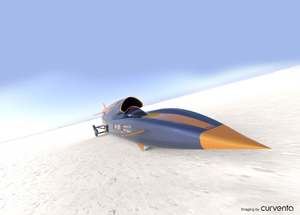News from the world of maths: Meet the fastest mathematician on Earth
Meet the fastest mathematician on Earth

Fancy crashing through the sound barrier in a rocket propelled car that goes all the way up to 1000mph? Well, we can't give you that experience, but we can get you as close as any maths magazine ever will. Last week we interviewed Andy Green, currently the fastest man on Earth (and Oxford maths graduate), who's now gearing up to break his own land speed record in his Bloodhound SSC — a pencil shaped car powered by a Eurofighter aircraft engine. The car is currently being simulated on super computers, exploiting the full power of computational fluid dynamics and all sorts of other bits of engineering maths, and it's just about to move into the construction phase.
You will be able to read our interview and an article on the maths that makes Bloodhound possible in the September issue of Plus, but meanwhile go and visit the Bloodhound SSC website. It tells you all there is to know about this engineering adventure, the car, and the team behind it. There's a substantial education programme associated to the project — you can sign up for engineering and maths based teaching resources, from instructions to build your own balloon powered car to experimenting with the speed of sound. You can also sign up for an email newsletter, or follow Bloodhound on Twitter.
posted by Plus @ 7:33 AM ![]()
![]()